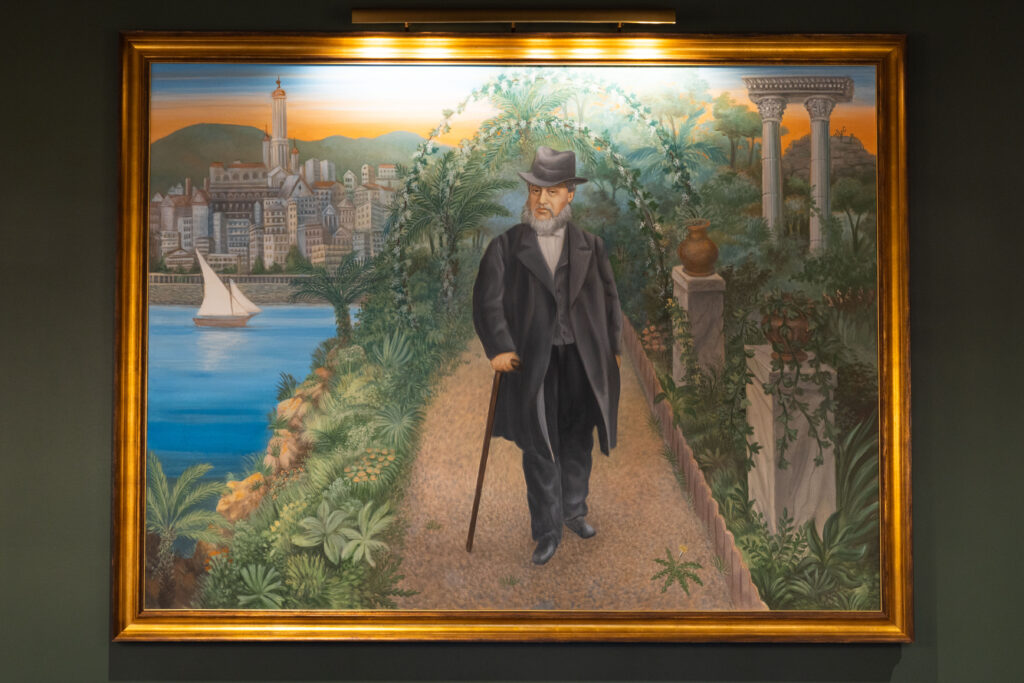
To understand Spurgeon, you must know something about his suffering. In this picture, Spurgeon is only in his late 50s, but you can see that the years have taken their toll on him. He’s not in London but in Mentone, southern France. This warm retreat was where he would regularly go to recover his health, especially during the cold and rainy London winters.
Spurgeon had many weaknesses, one of which was his tendency towards overwork. With all the pressures of pastoring, writing, publishing, and leading, Spurgeon always gave himself fully to his work and did not always take care of his health. His pattern would usually be that he would work himself to the point of illness so that he needed to take time off to recover his health. Over time, he began to develop all kinds of physical ailments: rheumatism, arthritis, kidney disease, and, worst of all, gout. Whenever his gout flared up, he would need a cane, and it could be excruciating to move or even to stand. These ailments could make life miserable for Spurgeon. In his private writings, he often confessed that he had no idea how he would bear up under all the pressures of ministry and physical suffering.
Perhaps even worse than his physical suffering was his emotional suffering. Spurgeon dealt with regular bouts of melancholy. He would feel low and discouraged. Sometimes, he would weep for no reason. Worst of all, at times, God felt distant. Part of his emotional suffering came after a traumatic experience in 1856. As he was preaching in front of an audience of 10,000 in the Surrey Gardens Music Hall, some troublemakers yelled “Fire,” resulting in a stampede. Spurgeon tried to restore order but could not, and he collapsed under the strain. By the end of the night, seven people were dead and dozens more injured. Spurgeon never recovered fully from that event.
The most difficult trial of his life, however, was the Downgrade Controversy. Towards the end of his life, Spurgeon detected the infiltration of theological liberalism within the Baptist Union. He published several articles in his monthly magazine arguing that their denial of the inspiration of Scripture, the atonement, the Holy Spirit, the resurrection, and other key tenets of historic Christianity proved that this modern theology was “no more Christianity than chalk is cheese.” But his warnings went ignored, and so in 1887, Spurgeon resigned from the Baptist Union. For that, the Union voted to censure Spurgeon publicly. Many of his closest allies, including some of his former students, turned on him. At the end of his life, Spurgeon was broken-hearted to see so many turning away from the gospel.
Despite all these trials, Spurgeon carried on, firmly planted in biblical truth and persevering in his labors until his death on January 31, 1892. But we should not think of him as a self-sufficient, self-assured pastor. Rather, so often, he was a needy, barely hanging on, desperate for God’s mercy, pastor. Had you run into Spurgeon at the height of his ministry, you would have been impressed by his voice, his outgoing personality, and his bold convictions. But perhaps you would also have been struck by his frailty, tiredness, and clear dependence on God. This is the suffering and prayerful ministry that the Lord used powerfully for nearly 40 years in London.
What’s the lesson of the cane? God uses our suffering for His glory. Because in a suffering, we experience God’s grace and sufficiency in a powerful way, and we can minister to others with the grace that we’ve received (2 Corinthians 1).
Things to look for:
- Rippon’s book on The Consolation of Christ
- Pastoral letters
- Downgrade Controversy letter on the desk
- Cigar display